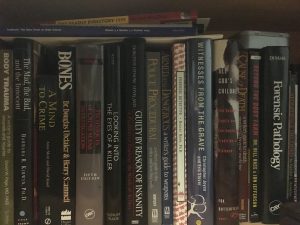I rarely talk about a story when the idea is just beginning to sprout, but I did just that a few weeks ago. The story landed like a giant bird on my head, squawking, “Tell this story now!” I started working on it immediately, cutting a long walk short, and even ordering a small beer (this took place in The Netherlands) so I could occupy a shady table a café and scribble in my notebook. After the scribbles, I walked back to where I was staying, grabbed my computer and drafted a good solid chunk of the story.
A friend asked me what I was writing and I told her a little about the story and its genesis. That’s when the issue of what the reader knows came up. I mentioned that a bookstore specializing in the occult would be one of the critical places in the story and that one of the characters might be a Wiccan.
“What’s a Wiccan?” She asked, and I thought she was kidding. She wasn’t. She had zero knowledge of what I thought was an ordinary point of reference. Because she was adamant and insisted that I was making a huge assumption about the knowledge of potential readers, I reworked a sentence explaining the reference to Wicca and Wiccans in a way that would be clear to any reader, but not pedantic.
That one additional line did no harm to the pace or tone of the story, but I still wondered about it. So when I got home and completed the first draft, I posted a query on my personal Facebook page asking about Wicca and Wiccans and most of friends seem to know about Wicca, a few offered themselves as experts in Wicca, Paganism, and related subjects. * Only one came right out and said she had no knowledge. Of course it was a completely unscientific survey with a self-selecting group of respondents, so it’s likely I have a few other friends that don’t know a Wiccan from a wicker basket.
The knowledge that readers bring to a story is a critical part of the equation that makes fiction work. Sometimes the writer is obligated to explain and educate, in order to avoid alienating the reader. On the other hand, too much exposition kills a good story. I just read ‘The Woman in the Window’ by A. J. Finn (recommended to me by the friend with the question inspiring this post) and the protagonist’s passion for classic Noir detective & suspense movies is a critical backdrop for the novel. I’m honestly not sure how a reader unfamiliar with ‘Dark Passage’ and ‘Vertigo’ in particular, and the genre in general, would be able to follow the breadcrumbs that led me to the solution of the mystery. In an odd coincidence, I’d caught a few minutes of ‘Dark Passage’ on TV right before I read the book including the scene with Lauren Bacall & Agnes Moorhead referenced by the character in the book. What the reader knows—or doesn’t know—is important and how the author uses common & uncommon knowledge is important, too.
*Yay—nothing like adding a new expert to my ‘Rolodex’ of people with extensive knowledge of interesting subjects!






Hmm…super important question this one. I /think/ genre plays a big part in the answer. As someone who reads and writes sci-fi, there are all sorts of things I’m familiar with that a reader of say, historical fiction, would not know.
‘Ah, but how many readers of historical fiction would pick up a sci-fi book?’
I honestly don’t know the answer to that one but as a voracious reader myself, I’d guess that others would read across genres as well. So history >> sci-fi is possible.
But I think there is an unspoken question here as well. If you do try and write for a diverse group of readers, how much exposition – i.e. explanation is good and how much is simply a boring info dump to everyone else?
Some things can be described subtly during the course of the plot, but I can’t imagine how you’d sneak something like Wicca or Wiccan into a casual description. :/
Try it and see? I guess that’s why beta readers are so crucial.
Yes! You’ve nailed the dilemma. How much to explain? How much can be assumed? As someone who reads across genres, I recognize genre specific knowledge. Historical romance readers know Regency from Victorian (and Edwardian and Georgian) and the subtle differences that make details ring true. Casual readers——not so much. Maybe it’s the circles I run in as well as the books I read, but I thought Wicca fell into the common knowledge category? Perhaps the solution is a delicate balance, one that dribbles a bit information to benefit the naive reader while not boring the readers already clued in to the specific knowledge.
I’ve recounted myths, described the sound of a bandoneon, discussed historical facts, and explained how an art conservator works——all to forward the plot in fiction. I’ve also made casual references to Shakespeare, famous paintings, and important cities, assuming that readers had some familiarity with those references. I think I solved the Wiccan thing in the story’s dialog. Here it is (grabbed from my first and as of now only draft):
Brigitte stood in front of the large selection of occult books.
“Are there many Pagans around here?”
“Funny you should ask. My partner is a devoted practitioner of the old religion—that is when he’s not busy being an accountant. Me? No, I simply believe in books, although I do enjoy all those seasonal celebrations. Winter solstice, summer solstice, equinox, all so lovely—he’s a Wiccan. It’s all about nature and natural cycles. If you’re interested, I think I have a book in English…”
“No thanks, but isn’t the summer solstice tomorrow?”
“Yes.”
I hope it works!